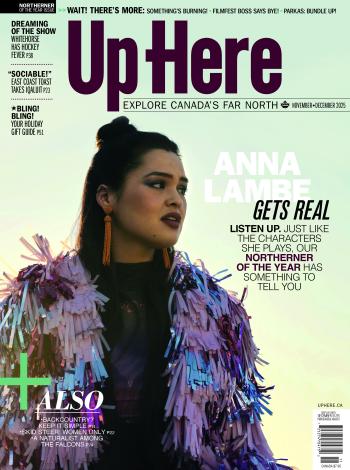Local lawyer Margo Nightingale has been leading Yellowknife’s adult choir—Aurora Chorealis—for the past 18 years. It’s a job she relishes and one that, if she hadn’t taken it on in 2001 when the previous choir conductor moved on, would have left the group to pack up its music and head home for good.
At that time, Nightingale had been a member of Aurora Chorealis since 1994, when she moved to Yellowknife to work as a Crown attorney at the federal Justice Department. She also sat on its board of directors. But when approached about becoming conductor, she refused, having never conducted before. A couple of months later, Nightingale found herself perusing choral arrangements at a music store in Calgary. Paging through the sheet music, she kept thinking, “this could be fun” and “maybe we could do this one.” Nightingale convinced herself to give the job of leading Aurora Chorealis a go—and keep the choir open. She has been director ever since.
“Aurora Chorealis is really about offering people community,” she says. And having stayed in Yellowknife—she now works as a sole practitioner in family law—she’s become a leading light on the local music scene. In addition to Aurora Chorealis, Nightingale sings with jazz groups and local theatre, and more recently, with a live band that performs as part of a local burlesque show. But choir is her first love, and that’s because it’s all about connection. “We form this massive instrument,” Nightingale says of Aurora Chorealis. “It’s a powerful experience being in the midst of that sound and that joint intention to make something great.”
What does choral music do for you that law doesn’t?
It uses a different part of my brain. Being a more physical activity, it allows for stress relief. Making music of any kind has that impact. In some ways, I wish the rest of life was like a choir practice. We’re bringing people together who are quite different. They have different backgrounds and different interests and different views, and yet we can set aside those differences and focus on what we share in common, which is actually making music. Together, we can do more.
What does it take to become a member of Aurora Chorealis?
We are open to people who like to sing and can carry a tune. We don’t ask people for auditions and we don’t need people to have any specific experience. We open the door pretty wide. Our age range is from 15 to 70-plus. And we’re taking new members, who are welcome, in September and in January.
Let’s be honest: Is it true that anyone can learn to sing, or are some of us just out of luck?
Personally, I like to think everybody can sing. That being said, some of us sing like Leonard Cohen and we have a range of maybe five or six notes. His music is amazing—but in a choir we really need to have folks who have a broader range than Leonard Cohen.
You don’t do auditions for Aurora Chorealis; you do a “voice check.” What’s that?
The voice check is designed to determine the range of someone’s singing voice. Do they have a low voice or a high voice and, with that range, where will they be able to contribute most comfortably and successfully in the choir? The second goal is to make sure that folks can carry a tune, so I ask them to sing “Happy Birthday.”
Are people nervous at a voice check?
We have all kinds of anxieties about our voice and how we sound. I try to make it fun and fast and rewarding. I can even sing with them. People need credit for taking that risk and letting me hear them sing “Happy Birthday.” I feel very lucky that people trust me in that moment.
How have you seen the choir grow?
When I started with the choir, there were about 30 regular members. Now there are as many as 80 when we do larger works, like Handel’s Messiah, which we do around Christmas. That piece is like a marathon for choristers because it’s about three hours long.
Does Aurora Chorealis have any other favourite scores?
On the flip side, singers ask to do choral programs that feature music from Africa, with percussion and drumming and dance. You couldn’t think of two more different programs, compared to the Messiah. One has a long tradition and history out of Europe, and the other has pieces of long traditional standing from another old continent, that is Africa. The joy that singers experience from both those kinds of music is really palpable.
What are some of the milestones the choir has achieved?
On National Indigenous Day in 2017 the choir sang at a performance of Leela Gilday’s Gho-Bah/Gombaa project, a collaboration with many Northern performers featuring songs about reconciliation and resilience. That was an opportunity to learn and sing some great Northern music. Then the opportunity came to do background harmonies for the album, which just became available for sale. It’s also called Gho-Bah/Gombaa, which means “first light of dawn.”
Does music help in your day-to-day?
Having a music outlet helps me to feel more balanced and objective in my role as a lawyer. I do family law, so I work with people in varying stages of crisis. Sometimes in your work, there’s a lot of heaviness, there’s a lot of heartache, a lot of sadness. To be able to reflect on that in a different setting—because a lot of our music can be really heavy, too—can be really helpful.










